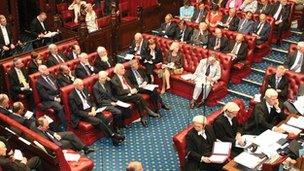Lords reform: Elected peers to have pay slashed
- Published

There are currently more than 800 members of the House of Lords
Ministers have decided to slash the pay of future members of a largely elected House of Lords, the BBC has learned.
The move is designed to answer Conservative critics who fear the coalition's proposals for reform could be hugely expensive.
The pay reduction comes after ministers agreed to increase the membership of the reformed chamber from 300 to 450.
The maximum earnings level could be about £45,000 a year - down from the original proposal of about £60,000.
MPs are to get their first chance to debate the plans - promoted by Deputy Prime Minister, and Liberal Democrat leader, Nick Clegg - to reform the Lords early next month.
The proposals face much opposition in Parliament and are hugely controversial among many Conservative MPs, who argue they could undermine the primacy of the House of Commons and should not be a priority during a recession.
The cabinet is expected to sign off plans for Lords reform on Tuesday before publishing the details on Wednesday.
Travel costs
It is expected to recommend an 80% elected and 20% appointed second chamber, with members elected by proportional representation for non-renewable 15-year terms.
The increase in size for the reformed Lords to 450 members was recommended by a joint committee of MPs and peers which said that the government's original plan for 300 members would leave too few to do the work.
Ministers had recommended that members of the reformed House of Lords should get a basic salary of around £60,000.
The government said the Independent Parliamentary Standards Authority (IPSA) should set the precise figure. But it stipulated that it should be lower than an MP's salary of £65,700 and it should be higher than that for members of devolved bodies, such as an Members of the Scottish Parliament, who earn £57,500.
But, with travel and accommodation expenses included, many critics fear the cost of Lords reform could spiral out of control.
Labour peer Lord Lipsey has claimed that the figure could be as much as £484m over five years, if the costs of a referendum, elections and the new salaries are taken into account. This is much higher than the current equivalent figure of about £91m.
Ministers accused Lord Lipsey of exaggerating the potential costs. Nevertheless, in response to concerns about costs, the BBC understands the government has decided to cut the salary back substantially.
Instead of a simple annual salary, members of a reformed House of Lords would earn £300 a day. This would be taxed and paid only if the member attended.
Labour talks
This is designed to encourage elected members to spend their time in the Lords and not in their large constituencies. Some MPs fear that elected peers would encroach on their constituency affairs.
But even if a member of the Lords attended every day, this salary would be substantially less than under previous plans. The House of Lords sits on average about 150 days a year and that means the most dutiful members of the reformed Lords would be on about £45,000 gross.
It appears the government has accepted the arguments of the joint committee which raised fears over a full-time second chamber.
Government sources said the new salary level suggested that members of the reformed House of Lords would be expected to have outside interests and jobs. The joint committee had claimed that this was necessary for the Lords to retain up-to-date outside expertise that would otherwise die out in a full-time house.
Labour supports reform in principle but is currently considering whether to oppose the government's timetable for the bill's progress through Parliament.
Leader Ed Miliband spent much of Monday in private talks with close advisers about the issue. But most Labour frontbenchers who spoke to the BBC said the party would oppose the so-called "programme motion", to ensure that Parliament retained control over the debate.
Critics, however, will say that the party is voting against reform to cause the government maximum trouble.
Many Tory MPs oppose the reform plans. Members of the executive of the Tory backbench 1922 committee will take their concerns to Downing Street on Tuesday for their first meeting with the prime minister since they were elected last month.
- Published23 June 2012
- Published22 June 2012
- Published19 June 2012
- Published18 June 2012
- Published9 May 2012